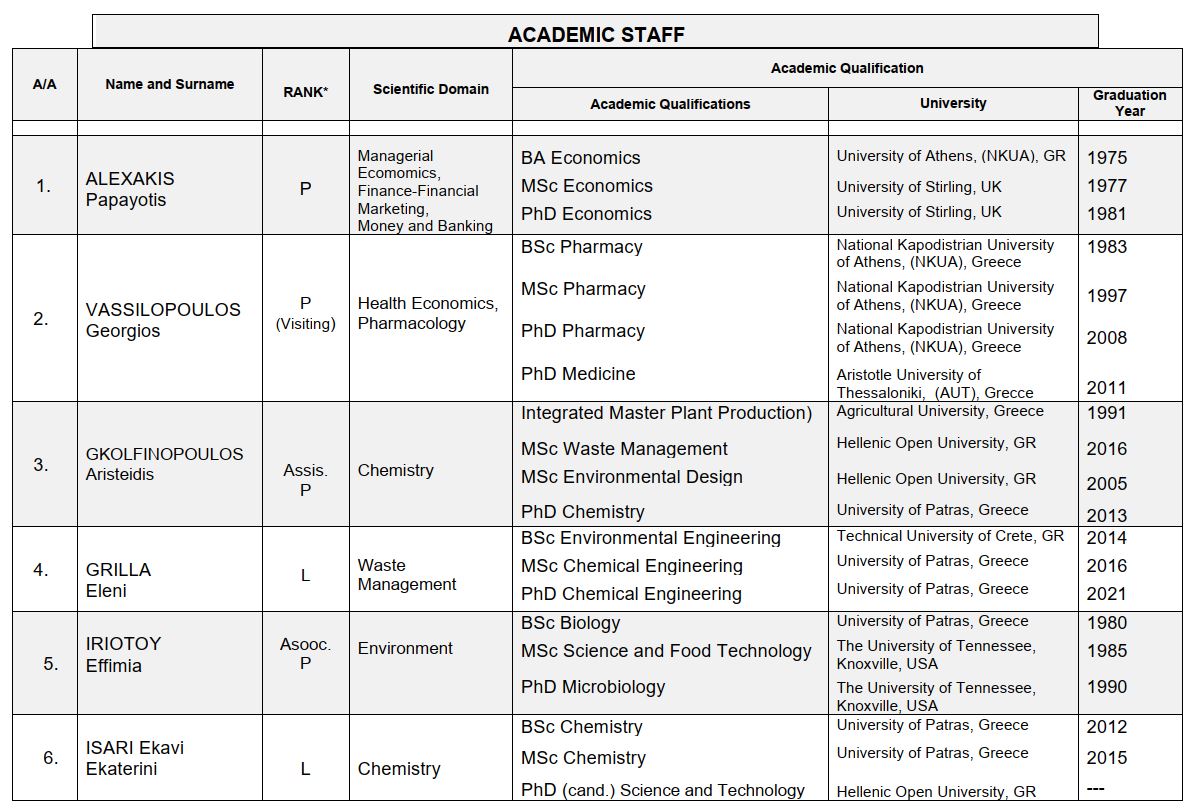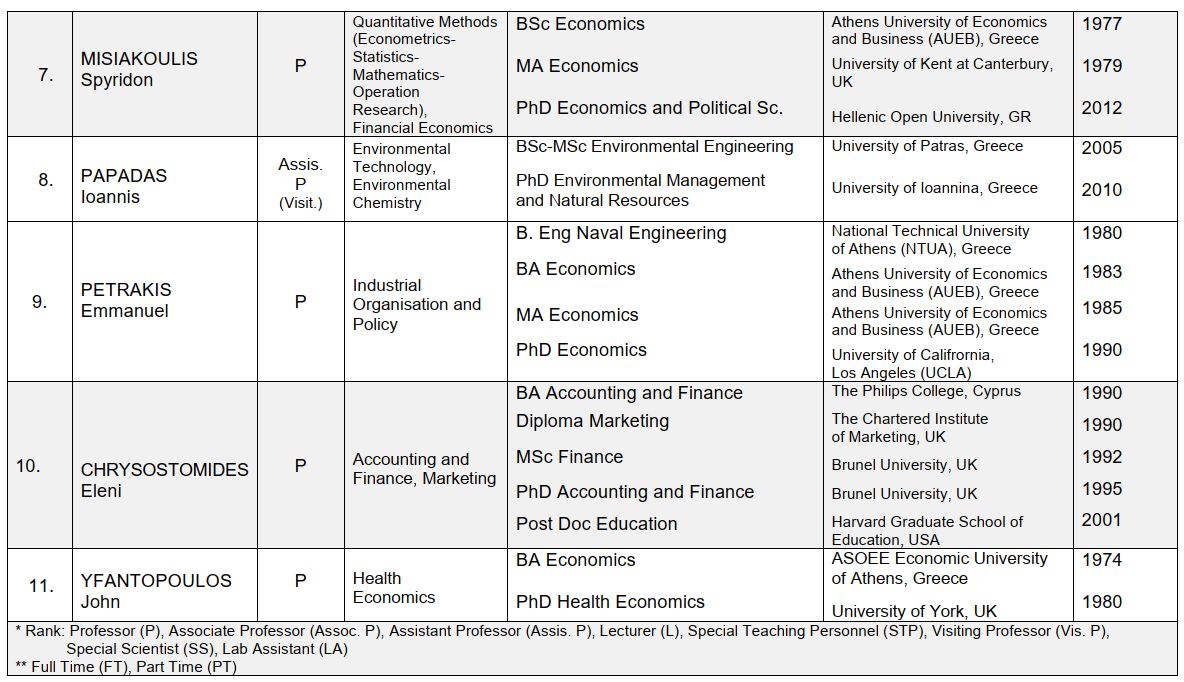| Duration | 18 months |
|
Qualification Awarded |
MSc in Environmental Management |
| Level of Qualification | Postgraduate |
| Language of Instruction | English & Greek |
| Mode of Study |
Distance Learning |
| Minimum ECTS Credits | 90 |
What is environmental sustainability?
According to the U.N. Environment Programme, environmental sustainability is the practice of interacting with the planet responsibility. We do it to avoid depleting natural resources and compromising the future generation’s ability to meet their daily needs and healthy lives, we need to live long and deserved unpolluted air to breath, clean water to drink, and live in places free of toxic substances.
In today’s competitive market, sustainability can become a critical profit centre for any organization such as energy savings, raw materials optimization and resources utilization.
In recent years, such as climate change, environmental degradation and gene/nanotechnologies have regularly highlighted the need to society to challenge and address risks and ethics in the sciences.
There is a growing evidence that companies take their environmental and social responsibilities seriously so as to perform better financially. All businesses, regardless of their location or industry can play a role in environmental sustainability, by re-shaping their activities to protect natural resources, reduce waste, and address threats from climate and weather.
For businesses, sustainability means running a business through sustainable practices and securing further growth potential without causing too much damage to the environment.
Finally, it is our job to ensure our future generations have healthy places to live and minimize our damage to earth’s biodiverse ecosystems.
The purpose of the programme is, to:
1. Provide a rigorous academic education leading to the MSc degree in Environmental Management with streams in one of the following areas:
• Sustainable Waste Management
• Environmental Management, Policy & Economics and Green Accounting
• Environment and Public Health
2. Provide students with a comprehensive understanding of the environmental issues that concern the current community, worldwide.
3. Develop a critical understanding of the importance of sustainable development to reduce the emissions to air, water and land.
4. Explore the exploitation of natural environments and the relationship between sustainable environmental management and natural ecosystems.
5. Meet the need for environmental professionals who understand the challenges of sustainable environmental management.
6. Offer a curriculum that maps out to the Cyprus Agency of Quality Assurance and Accreditation in Higher Education (CYQAA) academic benchmarks and yet aims to meet the accreditation requirements of:
• The Chartered Institution of Water Environmental Management (CIWEM), and
• The Institute of Environmental Management and Assessment (IEMA).
• Bachelor degree from an accredited institution of Higher Education
• Evidence that the applicant is competent in written and spoken English
• Successful completion of a personal interview with the Admissions Officer, either in person or by phone/skype
Applicants whose first language is not English, and who do not have a recognized degree or an equivalent qualification taught and examined in English are required to provide evidence of their competency in written and spoken English, normally through IELTS (5.5.- 6.00) or an equivalent qualification.
On completion of this programme, graduates should be able to:
• Understand and analyse in depth the effects of the presence of toxic and hazardous waste on the environment.
• Application of decontamination technologies either through conventional methods or with new technologies as well as a combination for the protection of the environment.
• Familiarization and deeping the role of science and society in dealing with environmental risks.
• Acquisition of specialized knowledge that a waste is useful with the appropriate treatment to reduce the pollutant load.
• Understanding basic issues of toxicology. Description of general toxicity mechanisms for the effects on human health following environmental exposure.
• Identify, analyse, synthesize and evaluate environmental health stressors and understand the ways in which they can affect health.
[1] Sustainable Waste Management Stream
On completion of this Stream, graduates should be able to:
• acquiring specialized knowledge of how a waste can be useful with appropriate treatment to reduce the pollutant load.
• gaining a comprehensive view of the environment and energy relationship.
• Environmental assessment for the optimal energy solution.
• acquiring knowledge on waste treatment with new, environmentally friendly technologies.
• determination of optimum process to improve efficiency to achieve better waste disposal after treatment.
[2] Environmental Management Policy, Economics and Green Accounting Stream
On completion of this Stream, graduates should be able to:
• develop their knowledge, understanding and skills in green and sustainable Accounting, Economics and Accountability
• increase your knowledge and understanding of the range of green and sustainable products and services in Green Accounting, Economics, Banking and Insurance sectors.
• raise awareness of the role of the financial sector and financial professionals in supporting the transition to a low carbon world.
• understand the main causes of environmental noise production and its negative effects, then learn about the main objectives of the Environmental Noise Framework Directive and related legislation.
• familiarize themselves with international conventions, protocols and agreements as well as the evolutionary steps of agreements and conventions.
• approach key features of environmental policy, so that knowledge and principles can then be promoted to social groups and institutionalized organizations involved in environmental issues.
• know the characteristics of environmental policy in the framework of the Common Agricultural Policy, EU decisions on climate change and energy, the role of the green economy and environmental objectives.
• understanding the principles of environmental policy, on which environmental management is based.
• discuss the potential of Green Accounting and Economics.
• gain critical knowledge in Green Accounting and Economics
• identify the stages of risk analysis
[3] Environment and Public Health Stream
On completion of this Stream, graduates should be able to:
• understand the structure and physiology of different kinds of microorganisms (bacteria, fungi, protozoa, viruses), their biodiversity and their interactions with the environment.
• understand key issues related to metabolism, including the concepts of aerobic and anaerobic respiration.
• know basic genetics, including transcription and translation.
• understand microbial ecology in relation to microbial interactions, succession, and community development.
• know the basic principles of microbial growth and their role in nutrient recycling, pollutant biodegradation processes and various biotechnological applications.
• familiarize with classic and modern microbiological analysis techniques.
• familiarize with the types of pollution (air, soil and water pollution), and evaluate environmental health stressors in the context of health effects triggering.
• familiarize with environmental and molecular epidemiology.
• familiarize with toxicology. Describe the general mechanisms of toxicity for causing effects on human health following environmental exposure.
• know environmental management policies and practices.
• evaluate laboratory analytical data of various parameters related to pollution.
• use risk analysis and risk assessment tools and techniques in environmental health management.
• plan the remediation of contaminated areas by choosing the appropriate methods considering costs.
• know sustainable solutions to environmental problems with an emphasis on green chemistry applications.
• know environmental justice issues.


Students studying towards the MSc degree in Environmental Management are required to take a minimum of ninety (90) ECTS. Thirty (30) ECTS come from the General Core, thirty (30) ECTS from the student’s chosen stream of study and thirty (30) ECTS from the Master Thesis.
| Cookie | Duration | Description |
|---|---|---|
| cookielawinfo-checkbox-analytics | 11 months | This cookie is set by GDPR Cookie Consent plugin. The cookie is used to store the user consent for the cookies in the category "Analytics". |
| cookielawinfo-checkbox-functional | 11 months | The cookie is set by GDPR cookie consent to record the user consent for the cookies in the category "Functional". |
| cookielawinfo-checkbox-necessary | 11 months | This cookie is set by GDPR Cookie Consent plugin. The cookies is used to store the user consent for the cookies in the category "Necessary". |
| cookielawinfo-checkbox-others | 11 months | This cookie is set by GDPR Cookie Consent plugin. The cookie is used to store the user consent for the cookies in the category "Other. |
| cookielawinfo-checkbox-performance | 11 months | This cookie is set by GDPR Cookie Consent plugin. The cookie is used to store the user consent for the cookies in the category "Performance". |
| viewed_cookie_policy | 11 months | The cookie is set by the GDPR Cookie Consent plugin and is used to store whether or not user has consented to the use of cookies. It does not store any personal data. |













